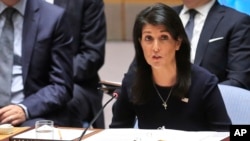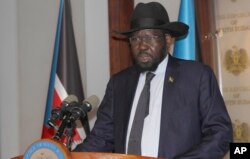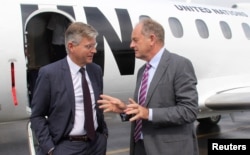South Sudan President Salva Kiir's spokesman said Tuesday that Juba would like to negotiate with the U.S. government over recently imposed sanctions on three individuals, including two senior government officials.
U.S. Ambassador to the U.N. Nikki Haley, however, defended the sanctions in a briefing to the U.N. Security Council in New York and called on the UNSC to act.
“The United States is not waiting to act. Earlier this month, we imposed economic and financial sanctions against individuals who have obstructed the peace process, denied access to humanitarian assistance and interfered with the peacekeeping mission,” Haley said. “The United States will do what it can to reduce the suffering in South Sudan, and the security council and regional actors must do more.”
'Bottom-line message'
She told the council the U.S. has “a bottom-line message” for South Sudan's leaders.
“That they seize this opportunity to take the initiative. They have a way to stop this violence. The intergovernmental authority on development has presented them with a way to resuscitate the peace agreement and to do so quickly, but time is running short,” said Haley.
She warned this is the last chance to salvage the 2015 peace agreement in South Sudan.
“The different parties must use the next several weeks to commit themselves to this process and to conclude it. Our hope is that South Sudan's leaders will seize this opportunity. If not, we must resolve now both individually and collectively to do more to end this conflict,” Haley said.
US called at close ally
Presidential spokesman Ateny Wek Ateny told "South Sudan in Focus" the U.S. has been a close ally of South Sudan and the two nations should work together to resolve any issues.
A policy analyst in Juba said, though, it is not the government’s place to negotiate the lifting of sanctions imposed on individuals.
Ateny said President Kiir wants to continue its “cordial” relationship with the U.S.
“If there is anything that the U.S. wants, or to discuss among ourselves, the fact is that we have to sit and talk about it. And particularly the sanctions the U.S. Treasury imposed on our officials was not helpful to the peace agreement,” said Ateny.
Earlier this month, the U.S. Treasury Department imposed the sanctions on South Sudan Information Minister Michael Makuei, Deputy Chief of Defense Malek Reuben and former Army Chief of Staff Paul Malong, saying the three engaged in actions or policies that threatened the peace and stability of South Sudan.
Bad information
Ateny claims the information used for charging the three men is not correct.
“When you look at the reasons for sanctioning the three officials, most of it is simply because they have done their constitutional mandate. It is a constitutional mandate for the chief of general staff to order an army to fight an insurgent,” said Ateny. “It is also mandatory for the deputy chief of staff to order supplies for the national army, and it is also constitutional for the minister of information to speak about the country.”
Policy analyst Augustino Ting Mayay at the Juba-based Sudd Institute strongly disagrees.
“These are individual cases, even though they serve in the system, they are not the country. And so the priority should lay with issues to do with the country. The country is facing a great deal of uncertainty given the fact that you have millions of people being displaced, you have the war continuing to take place, and the U.S. as a friend is frustrated given the fact that the initiatives for peace have not been implemented,” said Mayay.
Distrust of military concerns Shearer
United Nations Mission in South Sudan (UNMISS) chief David Shearer told the council about a “deep mistrust of military forces exacerbated by human rights abuses in South Sudan. Shearer noted that the opposition remains deeply fractured.
“At the same time, the economic crisis is further fueling public frustration and undermines the government's public capacity to deliver governance and services to its people. In many cases, civil servants have not been paid for months and salaries to security forces are also delayed,” said Shearer.
In an exclusive interview with South Sudan in Focus, Shearer said getting all the leaders of the warring parties “back to the table and focusing on the agreement that was already put in place is the best chance for achieving peace at the moment."
President Kiir and former first Vice President Riek Machar signed the peace deal in 2015, and both the opposition and government forces repeatedly have violated the deal, and they did so within a few days of its signing.
Unique corner of world
Shearer is no stranger to serving in conflict-ridden places around the globe. He has been a senior U.N. official in Iraq, Afghanistan, and the occupied Palestinian territories of the West Bank and Gaza Strip, but he acknowledges that South Sudan is a unique corner of the world.
“What sets it apart is the degree of underdevelopment. To move from Juba the capital to the town of Bentiu, where we have one of our bases, is a distance of 600 miles. It takes two weeks to do that because of the state of the road,” Shearer told "South Sudan in Focus."
“I’ve been in war zones before, but nothing like the level of development that is in South Sudan,” Shearer said.
He called it an “extraordinary challenge” for a country to lift itself out of that,”and offer real hope and a real future for its citizens.”







